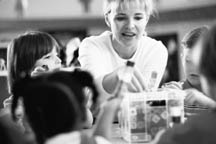Dialogue on Early Childhood Science, Mathematics, and Technology Education
Perspectives
Toward a Research Agenda in Early Childhood Science, Mathematics, and Technology
Education
Alverna M. Champion
“It takes a village to raise a child.” This well-worn African adage
is no less true today than it was when the thought was first made word. The
American Association for the Advancement of Science, with funding from the
National Science Foundation (NSF) and input from the Office of Educational
Research and Improvement (OERI) of the Department of Education, brought the
global village together in February of 1998. Mathematicians and scientists,
researchers and practitioners, teachers and administrators, and policy makers
from near and abroad gathered in Washington, DC, for a dynamic Forum on Early
Childhood Science, Mathematics, and Technology Education. We came together
as a unique community: each with different views, beliefs, and ideals but
all with similar commitments to improving the lives, opportunities, and fates
of young children aged 3 to 5.
We left the forum ready to inform the world about science, mathematics, and
technology education for young children. We left revitalized to teach those
who heretofore have been categorized as un-teachable. We left eager to encourage
the alienated. We left amenable to welcome, with open arms, the disenfranchised.
We left equipped to release the shackles from those children who are tethered
to labels such as “at-risk.” We left as we had come, reciting
the mantra, “All children can learn,” but now we actually believed
it.
 With
so much synergy at work, how can the National Science Foundation afford not
to support projects carefully crafted to improve the teaching and learning
of mathematics, science, and technology for young children? With the needs
of young children gaining the spotlight at all levels of government, it is
important that we seize the day. Submit a proposal! Consider the following
possibilities.
With
so much synergy at work, how can the National Science Foundation afford not
to support projects carefully crafted to improve the teaching and learning
of mathematics, science, and technology for young children? With the needs
of young children gaining the spotlight at all levels of government, it is
important that we seize the day. Submit a proposal! Consider the following
possibilities.
Margaret “Midge” Cozzens, the former director of the Elementary,
Secondary, and Informal Science Education (ESIE) Division of the National
Science Foundation, observed, “We don’t have a good synthesis
of the research on early childhood education as it relates to mathematics,
science and technology.” The Division of Re search, Evaluation, and
Communications and ESIE offer opportunities for funding in the areas of research,
evaluation, and assessment.
Hyman Field, acting director of ESIE, adds to Midge’s statement by encouraging
the submission of proposals that would enhance young children’s learning
of mathematics, science, and technology in settings outside the formal classroom.
Proposals for increasing parental involvement are a priority.
NSF has recently funded five projects on the development of early childhood
instructional materials. NSF, in funding a variety of projects, seeks to learn
more about what works, under what conditions, and for whom. These projects
are not intended to be exemplars; they are intended to serve as examples.
Funding innovative and creative instructional materials development projects
that focus on substantive mathematics, science, and technology is particularly
important to NSF.
Alverna M. Chapion is professor of mathematics at Grand Valley State
University in Grand Rapids, MI.
Copyright © 1999 by the American Association for the Advancement of Science
(AAAS)
 With
so much synergy at work, how can the National Science Foundation afford not
to support projects carefully crafted to improve the teaching and learning
of mathematics, science, and technology for young children? With the needs
of young children gaining the spotlight at all levels of government, it is
important that we seize the day. Submit a proposal! Consider the following
possibilities.
With
so much synergy at work, how can the National Science Foundation afford not
to support projects carefully crafted to improve the teaching and learning
of mathematics, science, and technology for young children? With the needs
of young children gaining the spotlight at all levels of government, it is
important that we seize the day. Submit a proposal! Consider the following
possibilities.